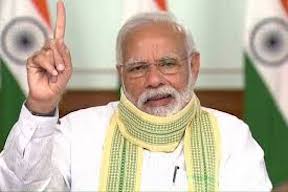Modi’s self-reliance call may spell protectionist turn for India
Once a key advocate of globalization, Prime Minister Narendra Modi appears to have all but abandoned it. His advice to Indians yesterday to “buy local” is seen signaling a turn toward protectionism.

“Self-reliance” was mentioned at least 17 times during Modi’s 33-minute address to the nation on Tuesday night, his third since imposing a nationwide lockdown to stop the coronavirus from spreading. While urging citizens to turn the crisis into an opportunity to grow local manufacturing capabilities, he said the state of the world today is a lesson for the country to become self-reliant.
“The corona crisis has taught us the value of local manufacturing, local markets and local supply chains,” Modi said. “Local is not only our need it is also our responsibility. Time has taught us that we will simply have to make ‘local’ our life’s mantra.”
He said India was making personal protection equipment for frontline medical workers, something it had no manufacturing expertise when the pandemic hit India in March. Similarly, sales of locally made hand-loom garments rose after he earlier asked citizens to embrace ‘khadi’ as he had done.
“There could be a more explicit protectionist bent on the trade front in the near term as India shapes up to be more self-reliant,” said Samiran Chakraborty and Baqar Zaidi, India economists at Citigroup Inc. The view was echoed by Rahul Bajoria of Barclays Bank Plc, who said it signals more measures “to protect and promote domestic manufacturing.”
Despite the push for going local, Modi is known for patronizing foreign brands. He uses BMW AG cars for his official travel, and has tweeted in the past using an Apple Inc. iPhone handset. He was pictured sporting Maybach sunglasses while witnessing a solar eclipse last year.
K.S. Dhatwalia, a spokesperson for the government, didn’t immediately reply to a text message seeking comments.
“Under Modi, India has become steadily more protectionist, and his speech made clear that this trend will continue,” said Akhil Bery, an analyst with Eurasia Group.
Similar Stories
December CNBC/NRF retail monitor results show strong growth boosted by final Thanksgiving weekend days
Retail sales jumped strongly in December, boosted in part by two busy holiday shopping days during Thanksgiving weekend falling in the final month of the year, according to the CNBC/NRF…
View ArticleNAW presents Dirk Van Dongen Lifetime Achievement Award to Bergman, CEO of Henry Schein, Inc.
At the 2025 NAW Executive Summit Gala on January 28 in Washington, D.C.
View Article
St. Louis region’s chemical industry welcomes new investment
View Article
Navigating compliance: Adapting to changing Customs regulations in global supply chains
View Article
December 2024 U.S. Transportation Sector Unemployment (4.3%) Was the Same As the December 2023 Level (4.3%) And Above the Pre-Pandemic December 2019 Level (2.8%)
View ArticleDP World appoints Jason Haith as Vice President of Freight Forwarding for U.S. and Mexico
DP World, a global leader in logistics and supply chain solutions, has announced the appointment of Jason Haith as Vice President, Commercial Freight Forwarding – U.S. and Mexico, effective immediately.…
View ArticleGet the most up-to-date trending news!
SubscribeIndustry updates and weekly newsletter direct to your inbox!





